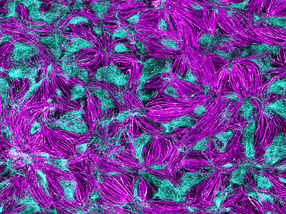Research supports Apoxis' selection of cancer target
07-Nov-2006
Apoxis SA noted recent research confirming the selectivity of their lead small molecule antitumour drug candidate APO866 for its Enzyme target. APO866 is a selective and potent inhibitor of a key enzyme in a pathway that provides cancer cells with energy and has been shown to starve cancer cells and induce cell death.
The article, which appeared in 'Nature Reviews Cancer', highlights the potential of nicotinamide phosphoribosyltransferase (NMPRTase) as a target for the development of anticancer therapies. NMPRTase is a crucial enzyme in the biosynthesis of NAD+, a co-factor in cellular energy metabolism and a substrate consumed in DNA repair. Depletion of NAD+ in highly active cells, such as cancer cells, leads to cell death.
In an article in 'Nature Structural & Molecular Biology' the authors elucidated the 3-D crystal structure of NMPRTase and showed that it comprises two units that come together to create a tunnel with the enzyme active site at one end. APO866 was found to bind tightly to the enzyme, blocking the tunnel and preventing the enzyme's natural substrate from reaching the active site, thereby severely reducing the cell's capability to produce NAD.
Apoxis acquired exclusive worldwide development and marketing rights for APO866, formerly FK866, from Astellas Pharma GmbH in December 2005. An earlier trial with the candidate has established that the drug is safe and well-tolerated in patients with advanced cancer. Apoxis has initiated Phase II clinical studies in 2006 in two orphan indications, cutaneous T-cell lymphoma (CTCL) and advanced melanoma and a proof of concept trial for B-cell chronic lymphocytic leukaemia.
Most read news
Topics
Enzyme
Apoxis
T cells
metabolism
melanoma
inhibitors
DNA repair
clinical trials
Astellas Pharma
molecular biology
Organizations
APOXIS
Other news from the department research and development

Get the life science industry in your inbox
From now on, don't miss a thing: Our newsletter for biotechnology, pharma and life sciences brings you up to date every Tuesday and Thursday. The latest industry news, product highlights and innovations - compact and easy to understand in your inbox. Researched by us so you don't have to.






















































